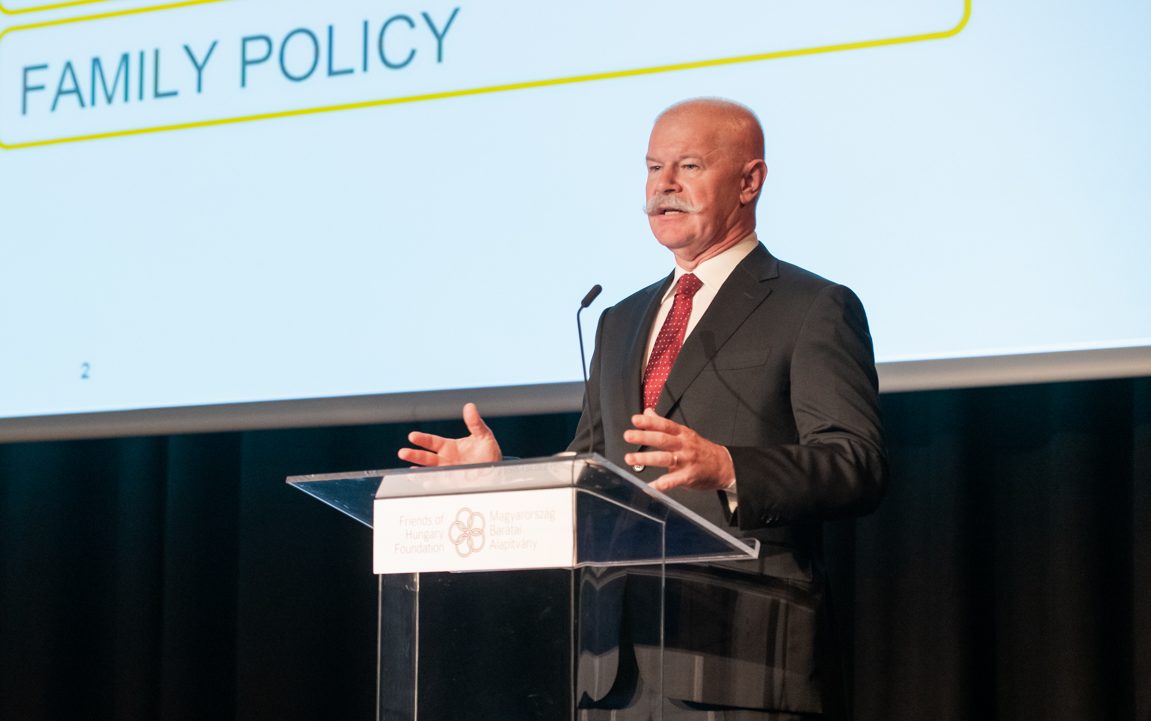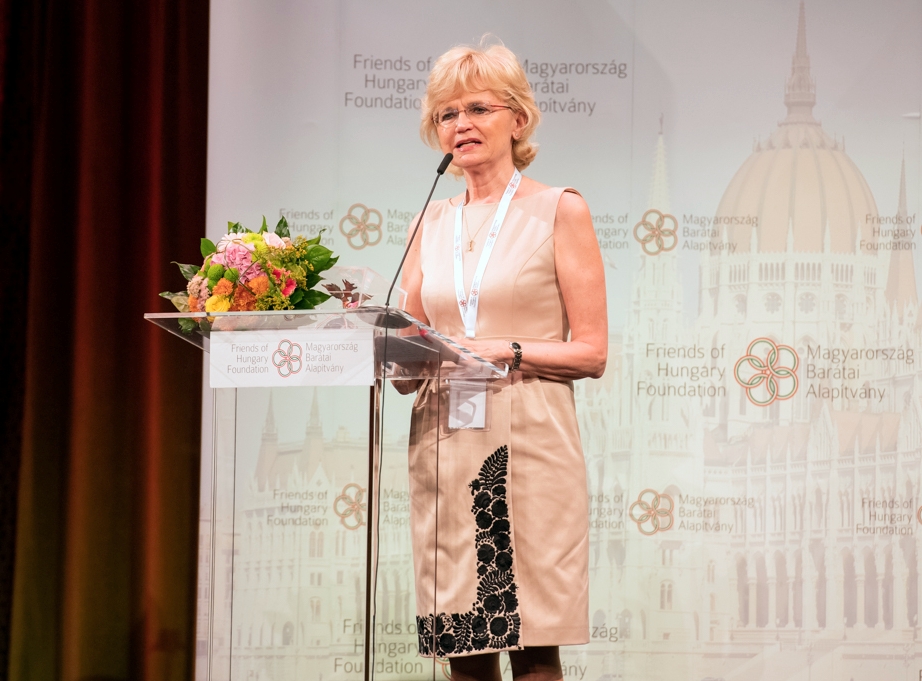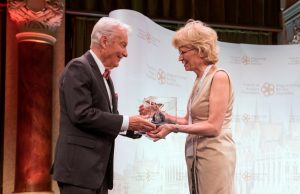
Members of Hungarian communities abroad come together in Budapest to share their experience, as well as their love for Hungary.Continue reading

Dr. Suzanne Papp Aykler is President of the Rákóczi Foundation of Canada since 2001. The organization primarily supports the education of Hungarian youth from across the border and North America through scholarships. In addition, the Foundation has organized the Students Without Boundaries every year since 1994. Each year, more than 100 talented young people from all over the Carpathian Basin and North America participate in this program. In total, there are now 3550 participants who have completed the program. The aim of the program is to deepen participants’ knowledge of history, literature and ethnography, to make friends from all regions of the Carpathian Basin, to meet young people from the diaspora and to share cultural treasures from home and the experience of being a minority.
Since 2015, Dr. Papp Aykler has been editor-in-chief of the newspaper “Canadian American Hungarian”. It is the only Hungarian-language press serving the North American diaspora. The newspaper has over 2000 subscribers and thousands of followers on its Facebook page.

Dr. Suzanne Papp Aykler receiving her award from the president of the Friends of Hungary Foundation, E. Sylvester Vizi.
I think the foundation stands for bringing together people who are concerned about the fate of Hungary, about Hungarian people, and since 1994, we have organized a program called Students without Boundaries which has brought together young people from five different countries: from North America as well as Hungarian minorities from Slovakia, Romania, Ukraine and Serbia and Hungary. Over 26 years, some 3,550 students have taken part in this program.
Students without Boundaries began when in 1993 my husband and I went to Ukraine to deliver donations to the newly forming schools in Transcarpathia. At the time, some 90 Hungarian language schools were reorganized when Ukraine declared its independence. We learned that they had learning materials, VHS tapes etc., but the administrators told us that the schools did not have the technical equipment to utilize them. No recorders, monitors, or photocopy machines or any kind of technology. We started our work with the teachers association who were trying their best to reorganize the newly formed Hungarian schools in Ukraine.
My husband William Béla Aykler was born there, he later became a Canadian citizen, but he really felt in his heart that he wants to give back to that region. One thing that was very sad was that on that trip we asked the young people we met whether or not they had ever been outside of their region. They admitted that they have never been to Kyiv because it was too far away, and they never traveled to Budapest because the costs of going there were simply too great. We decided that we wanted to do something about this. Mark Twain said that “travel is fatal to prejudice, bigotry and narrow-mindedness.” These young people were isolated and the program countered this. They were born into this large country, but they did not know their place in the world. Ukraine did not really want them, and Hungary did not want them either. So, in a sense, we Canadians reinforced their sense of worth and place of belonging. And with more and more minorities coming to our program, we understood that they are learning from each other. The basic message of the program is that: you are not alone in this world and a lot of people from around the world care about your fate. In fact, through the program they gained a support system.
The program was completely financed by businesses in Canada and around the world. We had a private donor from Israel, Yitzhak Livnat, who each year funded almost all the students from Transcarpathia, a region where he was born.
We are active in both countries. We award scholarships to students at the University of Toronto, to those who study Hungarian, and are interested in learning about Hungarian culture, even to students who have no Hungarian connections at all. I have spoken to students from all kinds of backgrounds who want to study about Hungary. Students have told me that they are taking courses in the Hungarian Studies Program because Hungary is a fascinating country, it has an interesting history, and they want to learn more about the history of central Europe.
Our foundation has always been a beacon for just that. Before I became president, the Rákóczi Foundation was already the first organization in Canada to publish English language reference books on Hungary. Published in English, these books were a resource you could buy for your grandchildren so that they know where they came from and where they belong. We support students of the Hungarian Studies Program with bursaries as well as organize conferences at the University of Toronto on topics that would appeal to second and third generation Hungarian-Canadians. You are right in that young people easily assimilate to better circumstances, but we also feel that we want to give back to those communities and those young people, so we provide scholarships to some forty students per year, so that they are able to continue their education. Many of these bursaries have been awarded to university students from Ukraine, who’s lives have been upended by the war.
The Foundation recently published a collection of essays entitled “Fresh Voices from the Periphery” in English. In this volume, 46 young people express their views on how they, representing the fourth generation since 1920, continue to live in minority status. The essays are constructive. One of the very first things we have learned from them is that they are very much attached to the region where they were born: whether it is Transcarpathia, Transylvania, Vojvodina, Slovakia or Moldova, they want to stay in the regions where they were born.
When they come to Hungary, they cross the border, there is a line that is drawn. When they go to a store wearing a Canadian insignia, a lanyard with the Maple Leaf on it, people ask: where are you from as you are speaking Hungarian? When they say, “I am from Ukraine,” the reaction usually is, “well, then you are Ukrainian.” So it appears that there is a big learning curve for Hungarians who live in Hungary. For forty years, during communism, people were not allowed to speak about Hungarians living beyond the country’s borders and now that has changed, but it might be too late.
There is also a need for these people to be accepted in their land of birth, and after one hundred years it is difficult to comprehend why they are not accepted in their own countries as minorities. As founding peoples of Slovakia, Ukraine, Serbia and Romania, they have been there, they are indigenous populations within these countries. The borders changed over their heads, they did not move anywhere. They have remained where they lived for generations.
I think there needs to be a lot more Canadian style thinking in a sense that the Hungarian minority in Transcarpathia would be a great asset for Ukraine right now. After the war is over, they will be an asset to rebuilding their communities. Why cannot these young people who speak several languages be accepted and integrated into Ukrainian society? Instead, the government has instituted language laws that have create resentment and disillusionment for minorities in Ukraine.
They have the right to be there, their ancestors have lived in these regions for many hundreds of years. When these educated and talented young people leave their land of birth, it is a great loss of human resources for the country itself. They are simply young people who would like to succeed in the country of their birth. They are not trying to change any borders, so we are just talking here about the acceptance of a minority for who they are and treating them properly.
Regarding our humanitarian projects, the Rákóczi Foundation has made a commitment to fund a free hot food program for refugees in Transcarpathia, Ukraine. Our donors have provided generously so that 80 refugees, displaced from the fighting from eastern Ukraine, are fed three meals per day. Our Board of Directors is committed to funding this project for six months, however, we hope and pray that the fighting will end soon. Once the war is over, we are also committed to assisting in the re-building of the country.
Featured Photo: Hungary Today